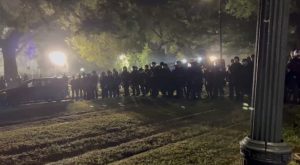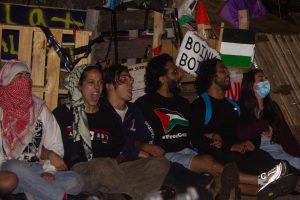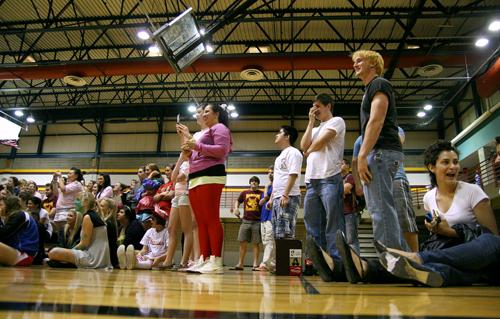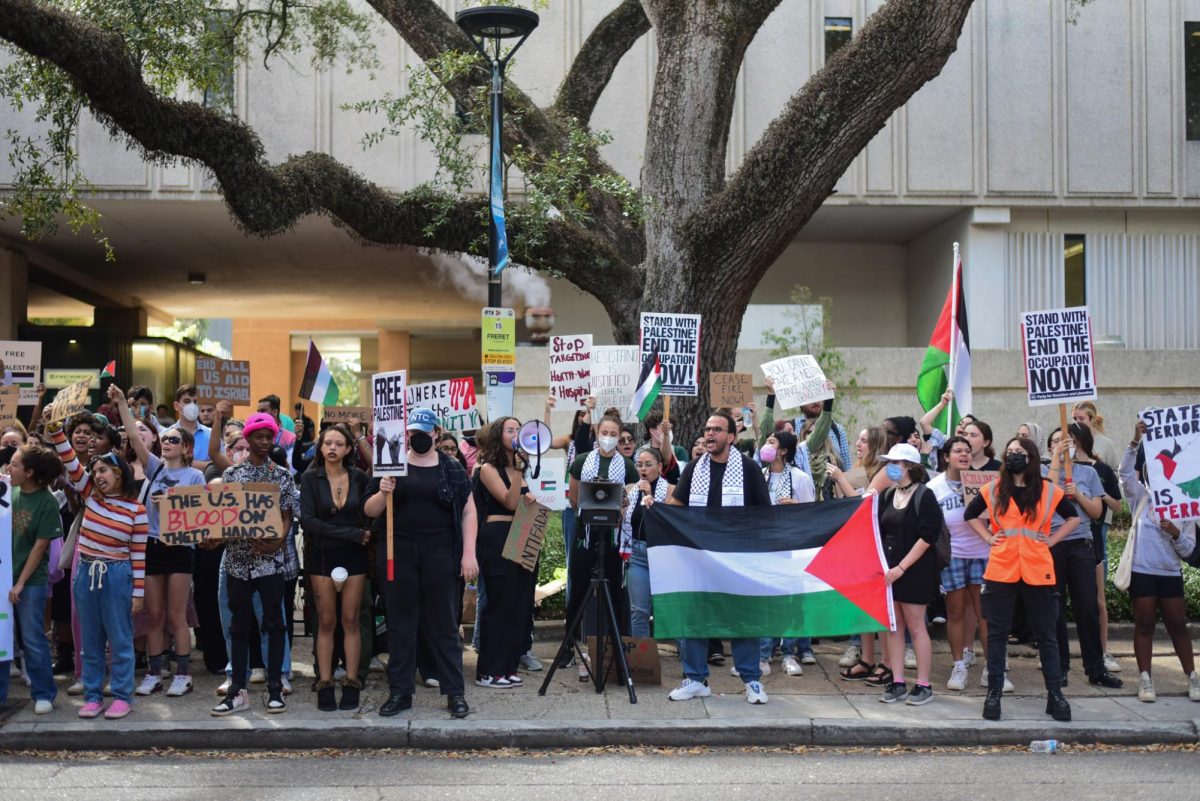The active chapter members of the Sigma Alpha Kappa fraternity were terminated and forced to disaffiliate April 7, 2010.
Jesus Garcia, management junior and former member of SAK, said their Alumni Association attended the fraternity’s chapter meeting several weeks ago to deliver letters of termination to the chapter.
“(The Alumni Association told) us to hand in everything we own that had SAK on it, and we could put in an appeal with the alumni board, and it would be up for review,” Garcia said.
“When it was inquired as to why we were being handed these letters of termination, they said, ‘You’ll be given the information we want to give you and nothing more,” Russell Misitch, political science senior and former SAK member, said.
“So how are we supposed to appeal when we don’t know our charges?” he said.
The Alumni Association planned to initiate new members in less than one week, going through a compressed pledge season, although the typical pledge season for SAK lasts seven weeks.
“What we’re doing is revolutionary,” Andrew Poland, political science junior and newly-appointed president of SAK, said. Poland, the only returning member from the previous active chapter, declined to comment any further.
Robert Redmann, SAK Alumni Association president, and Joey Macasieb, political science freshman and newly-appointed vice president of SAK, however, declined to comment regarding the newly created chapter under Poland and the termination of the former chapter.
Although the entire chapter had been forced to disband, some members, including Mistich, Justin Fecke, finance sophomore, Chris Graugnard, economics freshman, and Poland were offered membership back into SAK. Poland accepted and was installed as president, but the others did not.
“I don’t recall ever hearing of this sort of thing happening before. I’ve heard of national organizations…revoking the charter of a chapter, but not terminating everybody and then initiating all new members to replace them,” Mistich said.
According to numerous members, the alumni board may have made this decision after finding out the chapter extended honorary membership to Zachary Nusloch, a Tulane University freshman and former honorary SAK member. Nusloch was disaffiliated with the rest of SAK.
“We have in place an honorary system which allows by our constitution and our bylaws that if we meet … somebody who we think upholds the values of our fraternity…then we [can] give them an honorary status as an honorary brother,” Misitch said.
SAK has given honorary membership to several people, including Gary Herbert, philosophy professor; Mark LaHood, former assistant director of Residential Life; and Benjamin Martin, twin brother of former SAK Nathan Martin.
“(Nusloch) did mission work with (Garcia) with the Legion of Christ for an entire year last year, and when they came back he went to Tulane and he was always around, always hanging out, no matter what we were doing,” Mistich said.
“We said, ‘It’s a shame he can’t go through the pledge process, but we all think he is deserving of the honorary status,’ so we gave it to him.”
Garcia said Nusloch intended to apply to Loyola University, but never did.
“My initiation as an honorary was not contingent upon an application or an intent to apply to Loyola. These things have nothing to do with each other,” Nusloch said.
Mistich said the Nusloch incident was “the straw that broke the camel’s back” pointing to prior issues between the chapter and the alumni association.
In the spring 2009 semester, a new executive board, including Poland, Brian Lussier, criminal justice junior and Sean Hendler, political science sophomore, was elected and then impeached last fall due to “withholding financial information,” Mistich said.
Nolan Storey, English writing sophomore and former SAK member, said the alumni board did not want this impeachment to happen.
“We weren’t doing anything contrary to our constitution, we were simply making our own decisions, instead of letting a group of alumni board members run our group,” he said.
A new executive board, made up of Mistich, Garcia and Fecke, was appointed through a beer-pong tournament, which, Mistich said, upset the Alumni Association.
“There is a legitimate back-story for it,” Mistich said. “We didn’t just decide to get drunk and decide who wins is the new e-board. We had fought over how we were going to elect a new e-board for a solid month after (the impeachment) happened.”
Beer pong was played because, according to Mistich, voting by ballot would have caused voting blocs.
“To say that everybody agreed upon (playing beer pong) wasn’t entirely true,” said Louis McLaughlin, English literature junior. “(Poland) removed himself from the conversation. He said to (Mistich) at one point … that he was disaffiliating.”
McLaughlin said after his conversation with Mistich, Poland arrived at a meeting with the alumni board to introduce the new e-board, claiming he was active again.
“At that meeting, he said again, and everyone heard it, he said, ‘Ok, I’m disaffiliating with SAK.’ Disaffiliating is like, once you do it, you can’t go back. It’s different from going inactive,” McLaughlin said.
Because Poland claimed “disaffiliation” but is heading up the new group of SAK members, there is much tension between former SAK members and Poland along with new SAK members.
“This obviously causes a little bit more tension,” Mistich said. “It’s one thing to pull a charter because then, you’re done, you have no chapter on a campus. But by doing what (the alumni board is) doing, they’re asking people to have problems.”
According to Kelly O’Leary, economics junior and former SAK member, tensions have come to a head and legal actions are being threatened. In the letters of termination the previous SAK chapter received, they were told to surrender their SAK paraphernalia, including jerseys, O’Leary said.
In an e-mail sent to the previous members April 16th, Redmann again requested all SAK items be surrendered, giving the former members 24 hours and stating: “If you fail to comply (with surrendering paraphernalia), administrative, civil, and criminal proceedings will be instituted to the fullest extent allowed by the law.”
O’Leary said the items in question were bought by him with his personal money and not funded by the fraternity. In the e-mail, Redmann offered compensation for items under certain conditions.
“My understanding is that all the compensation we would get would be (for) anything we can produce a receipt and prove it wasn’t paid for by fraternity funds,” O’Leary said, adding that he has not kept receipts. He said he will not be returning his items. He also said he has since consulted with a lawyer, who plans to meet with both sides on the issue.
Despite the issues at hand, the previous members of SAK will not file an appeal.
“There’s no point in appealing something that’s going to go to a kangaroo court that is going to be telling us, ‘you have the option to appeal to us, the people who just handed you letters of termination without any notification, without any reasoning behind it,'” Mistich said.
In place of SAK activity, McLaughlin said he is looking forward to spending his time with other Loyola clubs and doing more community service. He said he will continue to remain friends with the other previous members as well.
“The thing is that we consider the brotherhood we have to be something real, something sincere… We hold it in higher regard than any set of colors or any set of Greek letters,” he said.
“We don’t need that kind of identity to prove that our friendship is real.”
Melanie Ziems can be reac
hed at [email protected] and Precious Esie at [email protected]













